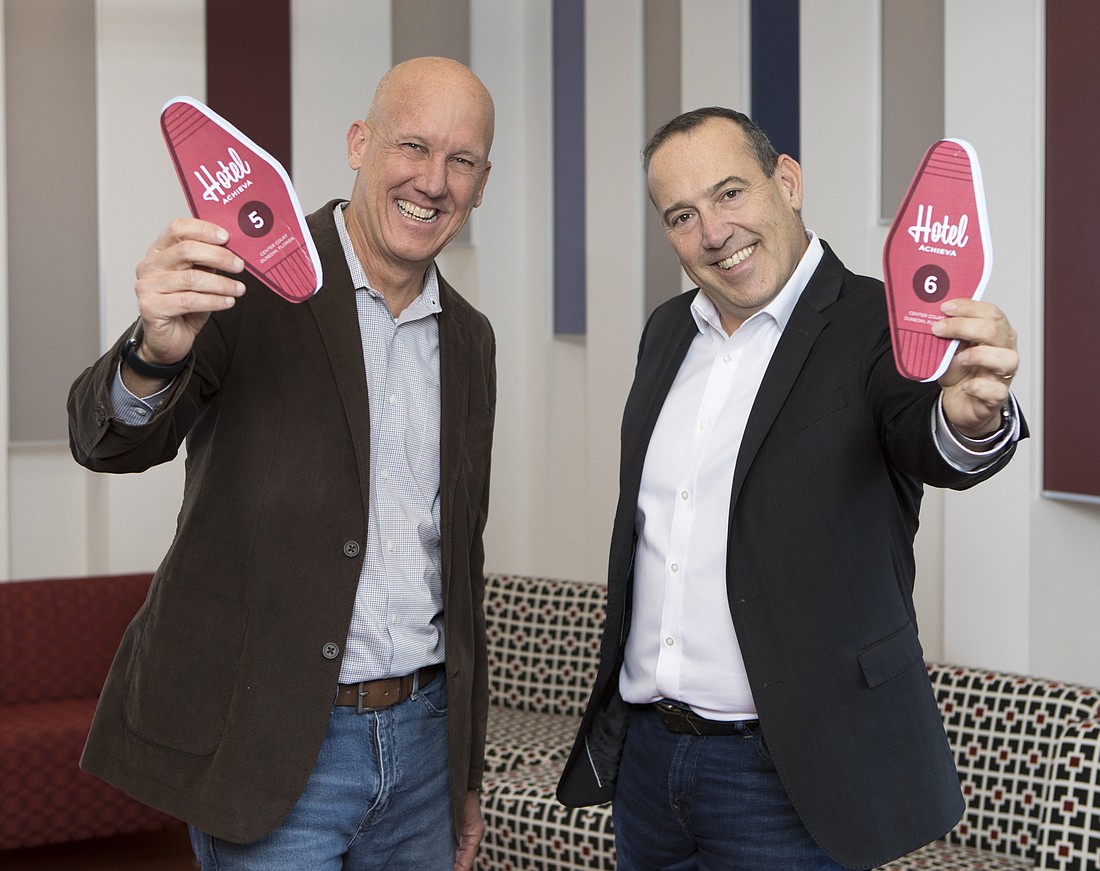- April 5, 2025
-
-
Loading

With hybrid work models all the rage as a result of the pandemic, many businesses that can function with at least a partially remote workforce are left wondering what to do with unused office space.
Achieva Credit Union, with the help of real estate firm Colliers International, has an innovative solution that addresses several challenges at once. Using its Dunedin headquarters, which it refers to as “Center Court,” as a testbed of sorts, Achieva has launched a “hoteling” program for remote employees who want to occasionally work in the office on a drop-in basis. On top of that, it has reconfigured vacant parts of the building and made them available for lease to third-party organizations.
“Our No. 1 focus is serving our members and being good stewards of their money,” says John Wintermeier, Achieva’s chief business officer. “As a member-driven organization, it's our responsibility to make the best use of our facilities, so we decided it was a good idea to explore leasing.”
On the flip side, several potential hiccups lingered with the strategy, namely, security and property damage risks. Achieva, founded in 1937, is one of the largest credit unions in Florida, with some 153,000 members and $2.1 billion in assets.
It’s not a typical landlord-tenant situation. They’re sharing the same space.’ Paula Smith, managing director of commercial services at Colliers International
Both Wintermeier and Achieva Chief Marketing Officer David Oak, whose entire department transitioned to remote work, say the hoteling and leasing efforts have gone smoothly — but only because the credit union’s leadership invested months of planning before making the moves.
“It was almost a year before we got our first tenant,” Wintermeier says. “That was deliberate. We immediately recognized there was an opportunity back in March and April 2020, when everybody was headed home, and that we needed to pivot.”
Oak is quick to point out the first step in the process was making sure Achieva’s own house was in order before opening it up to other companies. And that meant a full, long-term evaluation of the effectiveness of its hybrid work environment.
“Don’t put the cart before the horse,” he says. “We took the time to test and measure and see how this working from home thing panned out before we started inviting people in here to look at space. Make sure you can do it over the long term; otherwise, you’re going to be pulling back people [into the office].”
The credit union’s first tenant is Hyloq, a Dunedin digital marketing firm that counts Achieva as one of its clients.
“I approached them, and the timing was great,” Oak says. “They were looking for a new space.” He adds, with a laugh, “I don’t know if they like it there, though, because now I can walk in anytime when I’m at Center Court and ask them about all the jobs they’re working on for us.”
Colliers charges $19 per square foot for the move-in-ready office spaces. As of mid-February, two suites — one 1,576 square feet, the other 2,231 square feet — remained to be leased. Parking is provided and furniture can also be part of the deal, at extra cost, if required. Center Court’s other amenities include a self-service canteen, dog park, spacious courtyard, conference room and nearby bus stop. For security reasons, tenants must arrange their own Internet and phone service, but other utilities are included.
“They’re full-service leases,” says Paula Clair Smith, managing director of commercial services at Colliers International. “And the way we work with Achieva is very personal. We make sure we’re on all the tours” with prospective tenants.
Smith says it’s somewhat unusual for a company to lease out space in its corporate headquarters after it’s been the sole occupant for the building’s entire existence. But with the right working relationship, the arrangement can be a boost for both landlord and tenant.
“It’s not a typical landlord-tenant situation,” she says. “They’re sharing the same space.”
That means Hyloq signage had to be added to the building’s exterior, which is not typical of a corporate office lease. Also, Achieva requested that Colliers not place a “for lease” sign outside Center Court. “They didn’t want the community to think they’re selling or leaving,” Smith says.
Cost wasn’t a major factor thanks to how Center Court is laid out — “basically, they just moved a doorway,” Smith says — but that won’t always be the case.
“More than anything, it comes down to how the building is designed and functions,” she says. “In this case, Achieva is able to partition off, with adequate security, certain suites that they can then lease without any interference to their day-to-day business or compromising private information.”